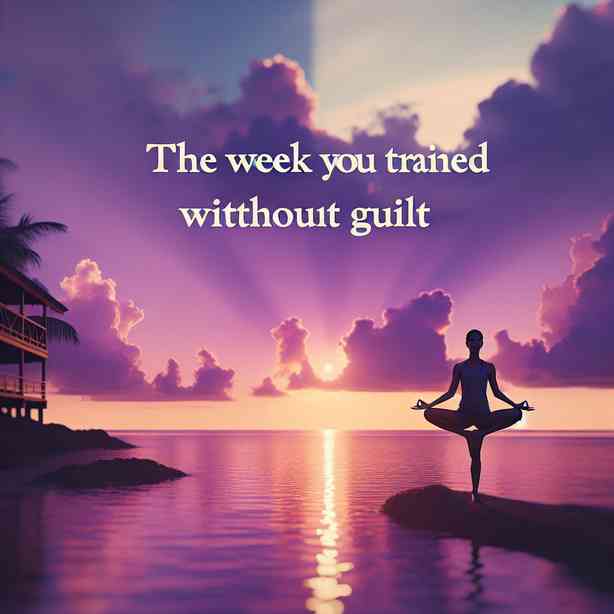
In the fast-paced world we live in today, many individuals often overlook the importance of taking time for themselves, particularly when it comes to physical fitness. The notion of guilt-free training has become a crucial topic of discussion. As we delve into “The Week You Trained Without Guilt,” we will explore the significance of embracing an approach to fitness that allows you to indulge in rest, recovery, and enjoyment without the burden of guilt.
The concept of guilt in association with training is all too common. Many people feel pressed to perform at their peak constantly, leading to burnout and a negative relationship with exercise. In this journey toward a guilt-free week of training, it is vital to acknowledge the mental and emotional facets of fitness alongside the physical. Understanding that rest is just as important as the workout helps to create a more balanced lifestyle and ultimately contributes to more sustainable fitness practices.
Beginning your week with a clear focus on your personal fitness goals and overall well-being can set the tone for your training philosophy. Instead of seeing exercise solely as a means to an end, it should be viewed as a form of self-care and personal enjoyment. This mindset encourages an enriched relationship with your body and movement, allowing you to find joy in the journey, not just the results. At this point, ask yourself what you truly enjoy about movement. Whether it’s yoga, running, or weightlifting, incorporating activities that bring you happiness can transform your training experience entirely.
As you embark on this week of guilt-free training, consider planning your workouts around activities that excite you. Variety is essential in keeping workouts fresh and enjoyable. Rather than sticking to a strict regimen, allow yourself the flexibility to explore different forms of exercise. Attend a dance class, go hiking, or engage in a new sport with friends. This approach reminds you that fitness does not have to be a chore; it can be an enjoyable part of your daily routine that fosters happiness and well-being.
Another key aspect to consider during this guilt-free week is the incorporation of rest days. Many individuals wrongly associate rest with laziness or weakness. In reality, rest is a critical component of any training program, allowing your muscles to recover and preventing injuries. As you take time off from structured workouts, embrace the opportunity to listen to your body and its needs. Use these days to engage in light activities, such as walking or stretching, which can aid in recovery while keeping your body active.
The psychological aspect of guilt often stems from societal pressures and unrealistic expectations of fitness culture. It is essential to detach from these external influences and focus on what works for you individually. Take a step back and evaluate your expectations. Are they realistic? Are they aligned with your own values and lifestyle? Having open conversations with friends, family, or a fitness community can be beneficial in understanding that everyone’s journey looks different. This support network can help in dismantling feelings of guilt and foster a more positive approach toward physical fitness.
As you progress through your week, it is also helpful to establish a self-reflection routine. Keeping a journal to document your feelings about exercise, your achievements, and any challenges you face can provide insight into your evolving relationship with fitness. Observing trends in your mood, energy levels, and motivation can highlight the importance of listening to your body and understanding when it’s time to push harder or when to ease off. This practice reinforces the idea that your fitness journey is not linear and that embracing its ups and downs is essential for long-term success.
Nutrition also plays a significant role in how we feel about our training. Finding balance in your diet should not be about strict restrictions or counting calories obsessively. Instead, aim to nourish your body with wholesome foods that fuel your workouts while allowing for indulgences that bring pleasure and satisfaction. This week, focus on mindful eating: savoring each bite, paying attention to hunger cues, and enjoying meals without distractions. This approach can help eliminate the guilt often associated with food choices and aligns with a holistic view of health.
Towards the end of your guilt-free training week, reflect on your experiences and what you have learned about yourself. Celebrate your achievements, no matter how small they may seem. Recognizing and celebrating these moments can build a positive reinforcement system that encourages continued growth and exploration within your fitness journey. This celebration can range from treating yourself to a new workout outfit, planning a fun activity with friends, or even just acknowledging your commitment to health.
Finally, as you conclude this week of training without guilt, remember that fitness is a lifelong journey that should bring joy and fulfillment. It is crucial to keep this momentum alive and integrate the lessons learned into your ongoing approach to health and well-being. The feeling of freedom that comes from practicing guilt-free training should not just be a one-time experience; it should become a cornerstone of your fitness philosophy.
Taking the guilt out of training is a valuable step towards building a healthier relationship with exercise and your body. As you continue with your fitness journey beyond this week, always remind yourself that every individual has their path, and it is okay to veer off the traditional route. Be kind to yourself along the way and remember that the ultimate goal is not just about achieving physical results but nurturing a loving and respectful relationship with yourself. By embracing this approach to fitness, you can cultivate a lifestyle that prioritizes health, sustainability, and most importantly, joy.


